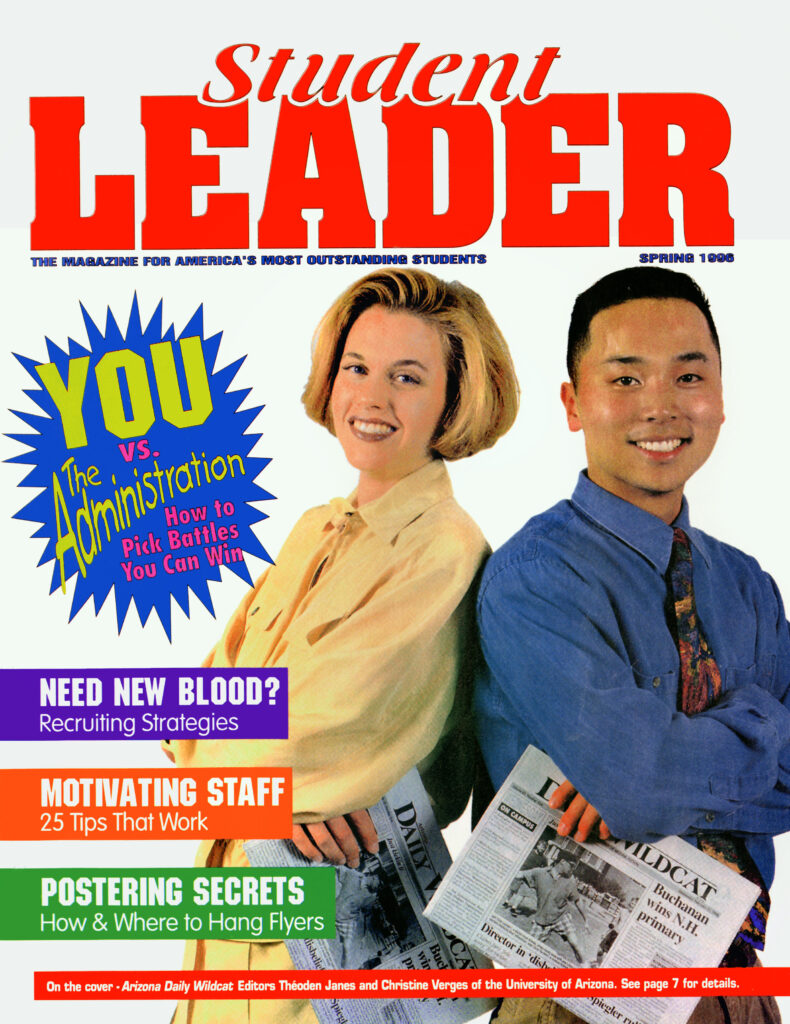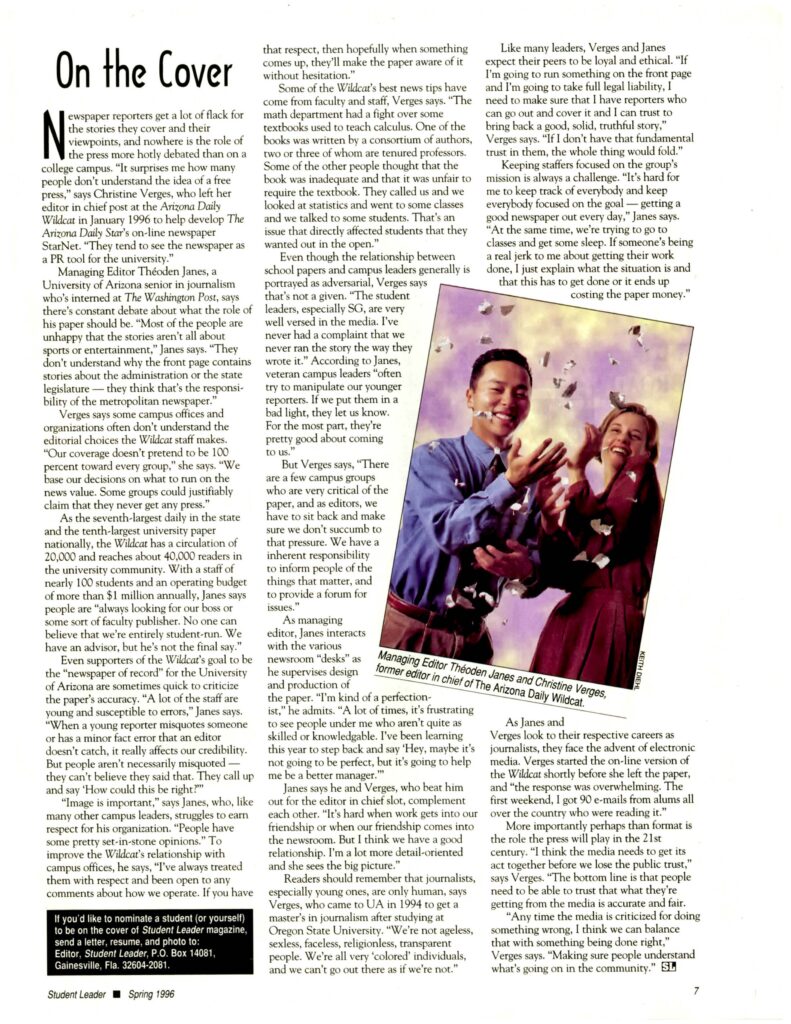Student Leader Magazine
Arizona Daily Wildcat editors Théoden Janes and Christine Verges of the University of Arizona, Page 7 (Spring, 1996)


On the Cover: Newspaper reporters get a lot of flack for the stories they cover and their viewpoints, and nowhere is the role of the press more hotly debated than on a college campus. “It surprises me how many people don’t understand the idea of a free press,” says Christine Verges, who left her editor-in-chief post at the Arizona Daily Wildcat in January 1996 to help develop The Arizona Daily Star’s online newspaper StarNet. “They tend to see the newspaper as a PR tool for the university.”
Managing Editor Théoden Janes, a University of Arizona senior in journalism who’s interned at The Washington Post, says there’s constant debate about what the role of his paper should be. “Most of the people are unhappy that the stories aren’t all about sports or entertainment,” Janes says. “They don’t understand why the front page contains stories about the administration or the state legislature — they think that’s the responsibility of the metropolitan new paper.”
Verges says some campus offices and organizations often don’t understand the editorial choices the Wildcat staff makes.
“Our coverage doesn’t pretend to be 100 percent toward every group,” she says. “We base our decisions on what to run on the news value. Some groups could justifiably claim that they never get any press.”
As the seventh-largest daily in the state and the tenth-largest university paper nationally, the Wildcat has a circulation of 20,000 and reaches about 40,000 readers in the university community. With a staff of nearly 100 students and an operating budget of more than $1 million annually, Janes says people are “always looking for our boss or some sort of faculty publisher. No one can believe that we’re entirely student-run. We have an advisor, but he’s not the final say.”
Even supporters of the Wildcat’s goal to be the “newspaper of record” for the University of Arizona are sometimes quick to criticize the paper’s accuracy. “A lot of the staff are young and susceptible to errors,” Janes says. “When a young reporter misquotes someone or has a minor fact error that an editor doesn’t catch, it really affects our credibility. But people aren’t necessarily misquoted — they can’t believe they said that. They call up and say ‘How could this be right?'”
“Image is important,” says Janes, who, like many other campus leaders, struggles to earn respect for his organization. “People have some pretty set-in-stone opinions.” To improve the Wildcat’s relationship with campus offices, he says, “I’ve always treated them with respect and been open to any comments about how we operate. If you have that respect, then hopefully when something comes up, they’ll make the paper aware of it without hesitation.”
Some of the Wildcat’s best news tips have come from faculty and staff, Verges says. “The math department had a fight over some textbooks used to teach calculus. One of the books was written by a consortium of authors, two or three of whom are tenured professors. Some of the other people thought that the book was inadequate and that it was unfair to require the textbook. They called us and we looked at statistics and went to some classes and we talked to some students. That’s an issue that directly affected students that they wanted out in the open.”
Even though the relationship between school papers and campus leaders generally is portrayed as adversarial, Verges says that’s not a given. “The student leaders, especially SG [Student Government,] are very well versed in the media. I’ve never had a complaint that we never ran the story the way they wrote it.” According to Janes, veteran campus leaders “often try to manipulate our younger reporters. If we put them in a bad light, they let us know. For the most part, they’re pretty good about coming to us.”
But Verges says, “There are a few campus groups who are very critical of the paper, and as editors, we have to sit back and make sure we don’t succumb to that pressure. We have an inherent responsibility to inform people of the things that matter, and to provide a forum for issues.”
As managing editor, Janes interacts with the various newsroom “desk ” as he supervises design and production of the paper. “I’m kind of a perfectionist,” he admits. “A lot of times, it’s frustrating to see people under me who aren’t quite as skilled or knowledgable. I’ve been learning this year to step back and say, ‘Hey, maybe it’s not going to be perfect, but it’s going to help me be a better manager.”‘
Janes says he and Verges, who beat him out for the editor-in-chief slot, complement each other. “It’s hard when work gets into our friendship or when our friendship comes into the newsroom. But I think we have a good relationship. I’m a lot more detail-oriented and she sees the big picture.”
Readers should remember that journalists, especially young ones, are only human, says Verges, who came to UA in 1994 to get a master’s in journalism after studying at Oregon State University. “We’re not ageless, sexless, faceless, religionless, transparent people. We’re all very ‘colored’ individuals, and we can’t go out there as if we’re not.”
Like many leaders, Verges and Janes expect their peers to be loyal and ethical. “If I’m going to run something on the front page and I’m going to take full legal liability, I need to make sure that I have reporters who can go out and cover it and I can trust to bring back a good, solid, truthful story,” Verges says. “If I don’t have that fundamental trust in them, the whole thing would fold.”
Keeping staffers focused on the group’s mission is always a challenge. “It’s hard for me to keep track of everybody and keep everybody focused on the goal — getting a good newspaper out every day,” Janes says. “At the same time, we’re trying to go to classes and get some sleep. If someone’s being a real jerk to me about getting their work done, I just explain what the situation is and that this has to get done or it ends up costing the paper money.”
As Janes and Verges look to their respective careers as journalists, they face the advent of electronic media. Verges tarted the online version of the Wildcat shortly before she left the paper, and “the response was overwhelming. The first weekend, I got 90 e-mails from alums all over the country who were reading it.”
More importantly, perhaps, than format is the role the press will play in the 21st century. “I think the media needs to get its act together before we lose the public trust,” says Verges. “The bottom line is that people need to be able to trust that what they’re getting from the media is accurate and fair.
“Any time the media is criticized for doing something wrong, I think we can balance that with something being done right,” Verges says. “Making sure people understand what’s going on in the community.”